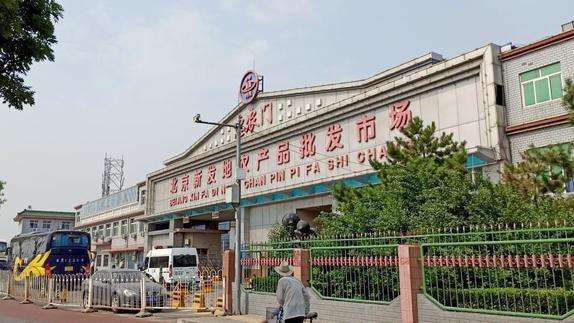 This photo shows Xinfadi, the largest wholesale market with fruit, vegetable and meat supplies in Beijing, which was closed on June 13, 2020 after new cases of COVID-19 emerged. (PHOTO / CHINANEWS.COM VIA CHINADAILY.COM.CN)
This photo shows Xinfadi, the largest wholesale market with fruit, vegetable and meat supplies in Beijing, which was closed on June 13, 2020 after new cases of COVID-19 emerged. (PHOTO / CHINANEWS.COM VIA CHINADAILY.COM.CN)
Wu Zunyou, chief epidemiologist at the Chinese Center for Disease Control and Prevention, and Zeng Guang, a senior researcher at the Chinese Center for Disease Control and Prevention, answer questions about the new COVID-19 cases reported in Beijing
Why is Xinfadi wholesale market suspected to be the source of the latest COVID-19 outbreak in Beijing?
Wu: Normally, the lower the temperature, the longer virus can survive. In such wholesale markets, seafood is stored frozen, enabling the virus to survive for a long time, resulting in increased chances of its transmission to people. Additionally, a large number of people enter and exit such places, and a single person entering with the coronavirus can cause the spread of the virus in these places. As all the confirmed cases in this outbreak are found to be linked with the market, attention was given to the market.
As all the confirmed cases in the outbreak in Beijing are found to be linked with Xinfadi wholesale market, attention was given to the market, said Wu Zunyou, chief epidemiologist at the Chinese Center for Disease Control and Prevention
ALSO READ: Beijing swift to curb new COVID cases
What is the source of transmission of the virus in the market? Is it people, foodstuffs such as meat, fish or other things sold in the market?
Wu: It is very difficult to conclude the exact source of the transmission. We cannot conclude that the salmon sold in the market is the source just based on the finding that cutting boards for salmon in the market tested positive for the virus. There may be other possibilities such as that one owner of a cutting board was infected, or other food sold by an owner of a cutting board tainted it. Or a buyer from other cities caused the virus' spread in the market. The flow of people in the market was big, and many things were sold. It is not likely the exact source of transmission will be found in a short time.
Before the outbreak, Beijing had reported no new locally transmitted COVID-19 cases for more than 50 days, and the coronavirus should not have originated in the market. If it is confirmed after investigation that none of the new cases of people who tested positive for the virus got infected in Beijing, then it is likely that the virus was introduced into Beijing from overseas or other places in China via tainted goods.
READ MORE: Salmon called unlikely source of coronavirus
How big is the risk of further spread of the virus in Beijing?
Wu: Right now, the key task for COVID-19 control and prevention in Beijing is to identify the source of transmission and find all close contacts of confirmed cases to prevent further spread of the virus. Beijing has been responding very quickly this time, and I have full confidence in epidemic control in Beijing.
Arduous efforts are needed to reduce risks of further spread of the virus, including dispatching a large number of professionals to search for close contacts of confirmed patients and conducting lab analysis on the virus samples as quickly as possible.
Based on the known information, the rebound of the outbreak has been largely limited to areas surrounding Xinfadi market, and the virus has not spread to the whole area of Beijing and threatened its total population of more than 20 million.
What should Beijing residents pay particular attention to in light of the epidemic control situation?
Wu: There is no need for the public to panic, as we have accumulated rich experience in COVID-19 epidemic control and treatment of patients.
The city authority has published the movement path of all the confirmed patients, so residents who find they have been to affected places can pay more attention to their health condition and receive nucleic acid tests if necessary. For other residents, it is still necessary to maintain good habits such as wearing masks in places that lack ventilation and frequently washing their hands.
Is it necessary to conduct nucleic acid tests for coronavirus on the whole population of Beijing?
Zeng: No. But expanded testing is required to cover places including stores in residential compounds where goods from Xinfadi wholesale market are sold, and other residential compounds and restaurants linked with Xinfadi in the city.
READ MORE: Beijing reports 36 new confirmed COVID-19 cases


